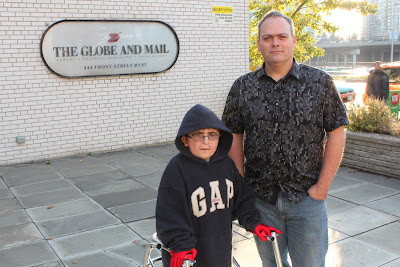This is a condensed version of an interview that appears in the January issue of BLOOM magazine. I don't think I've spoken to anyone who's made me stop and think the way Dr. BJ Miller does. Louise
Dr. BJ Miller was a successful Princeton sophomore when he and his buddies decided, on a lark, to climb atop a parked commuter train; the lark turned dark when the train's electric voltage arced to his metal wristwatch, resulting in the loss of his legs below the knees and part of his left arm. As a triple amputee he went on to graduate and become a palliative-care doctor. He’s now executive director of the Zen Hospice Project in San Francisco. "I learned so much, particularly about perspective,” he says. “It's not what you see but how you see it."
BLOOM: It sounds like you were someone who had everything – at least on the outside – before your accident. How did becoming an amputee change you?
Dr. BJ Miller: I was well aware that I was very fortunate in many ways when I was younger and while that was good, it was also tough. Whenever I worked hard or was proud of something, it was discounted. I couldn’t take any credit for any of my achievements – or my pain. It was a bit of a funny relief when I became an amputee because I finally had an external source of suffering. Finally people stopped treating me like the world had just been handed to me. It gave me access to humanity in a different way and that helped me. It didn’t feel this way every minute, but I worked towards it feeling like a source of good fortune. Of course it was also a source of a great deal of pain and anxiety too. I’ve had the full gamut of emotions but on balance, over the years, more good than bad has come from it.
BLOOM: What was the greatest challenge for you?
Dr. BJ Miller: In a nutshell, how to see things differently. By pulling me out of my anything-approaching ‘normal’ frame of reference it really helped me upend that endless cycle we humans engage in of constantly comparing ourselves with those around us. Am I smart enough, rich enough, skinny enough? Compared to what? That’s the question I got to open up. I was given a way to let myself off that hook and be my own frame of reference. That was extremely liberating for me and it gave me a way into self-actualization that was wonderful.
It’s still a great challenge to keep it up – to still be my own boss, to be my own gauge. As much as that’s the greatest gift, it remains the greatest challenge. A critical subtext for disability and for my palliative work comes to this issue of following one’s own gut and reconciling what the external world wants and thinks and needs from you with being true to yourself. There isn’t a pat answer to that.
When I talk to school kids they’ll say “Don’t you miss having two hands?” and I’ll invariably say “Yea, I do, but don’t you miss having three hands?” Because for me personally it’s as ludicrous to go around thinking about having two hands as it is for them to think about having three. “I don’t sit around missing them anymore than you sit around missing three,” I’ll say. This frame-of-reference issue is a powerful thing.
BLOOM: How hard was it to relearn how to do things as an amputee?
Dr. BJ Miller: It took five years of hard work before I felt truly in my body again and coordinated in a new way. I think the hardest thing remains the arm. Having two hands is way easier than one, and the hands are so important. Sure, I miss my feet, but they’re just like a platform. They’re easy to duplicate. I can get around on my prosthetic legs.
BLOOM: What did you learn about having a visible difference in our culture?
Dr. BJ Miller: I’ve learned a lot because I was suddenly snapped into being part of a minority, of being ‘the other.’ All of a sudden I embodied something that most people fear. I was very aware of this sort of repulsion that people felt. It was hard to see the terror on kids’ faces, or parents pulling their kids away from me. Or if I surprised someone, and I was wearing shorts, and they were horrified. Sometimes it took the guise of pity, which I knew from my mom was the enemy. Sometimes the pity felt nice because old women would come up and give me $20 – even when I was in medical school! It definitely was hard and I had to really concentrate on sticking my chin out when I walked out of my bedroom to face the day.
The fascinating part was that about two years after the accident I noticed people’s reactions got a little better. And after five years I noticed a big difference. I must have carried myself differently. At first, I’d drive like a mad man and get pulled over by the cops and they’d take one look at me and let me go. Or if I was flying, I’d be bumped up to first class every time and they’d sneak bottles of wine into my bag. But then that just stopped. Did I reach a new level that I didn’t trip up these responses in others or had society evolved?
BLOOM: How did you cope in the early days?
Dr. BJ Miller: I was full of pain and fear. But I can’t tell you how important it was having grown up with a disabled mother. For much of my mother’s life she used an electric wheelchair and being in the world with her, I vicariously learned a ton of the things we’re talking about. As a child I was sensitive and a little worried – ‘Gosh, I’m lucky in all these ways and could I even handle it if I had a disability?’
So I was coming from a different place when I became an amputee than most people. I loved my mother so much and was aware of the way the world treated her – and yet I didn’t want to collapse into hating life. These issues had been rumbling around in my head for a while. I didn’t wake up on day one and see my situation as a great challenge. But pretty soon I was aware that it was that – a great challenge. I knew that and I had to live it.
BLOOM: Do you have a personal philosophy that helps you see things with perspective?
Dr. BJ Miller: I’ve only read The Serenity Prayer a couple of times but I’d have to say that it registers with me. Teasing out what you can control from what you can’t control – I can’t think of a better skill to acquire as a human being than that. Because whether or not you qualify as disabled, life is full of pain and difficulty. Even if you have all the perfect circumstances, at some point Mother Nature will insist upon certain things from you, like your own death. You can’t change the things you’re looking at in so many ways, but if you’re going to use your energy, put it into how you see.
BLOOM: Why did you become a palliative-care specialist?
BJ Miller: Because all of the things I’ve learned to get through my day seem to have broader relevance for people dealing with various themes of suffering. Suffering is a unifying human bond and it comes in many stripes and colours. And even if you have a perfect life you still have to say goodbye to it at some point. I love finding and working from the common denominator – and suffering and mortality are the most thorough.
After med school I thought I would go into rehab medicine but when I did a rotation in that I was turned off. It seemed to be a very mechanical field, while a lot of what we’re talking about has to do with the transformational powers of coping with disability – that there’s this raw material for transformation and growth and interest.
The goal in rehab seemed to be to get back to where you were before the injury and that to me was fundamentally flawed. Generally it’s not possible, but more importantly, why undermine and cut yourself off from all the beautiful stuff that comes your way when you embrace differences? I’m sure there’s a balance to be struck with therapy, but overall, celebrating differences – especially the ones you can’t change – is a better way through, if you ask me.
Photo above by Brant Ward ran with a feature about BJ in the San Francisco Chronicle.

























































